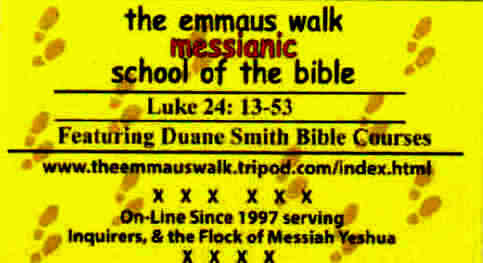
Judges: "Samson: Backslidden Nazarite and Judge of Israel,"
Or, "Hope for the Washed-Up Christian,"
by Ronald Ginther

INTRODUCTION TO SAMSON IN JUDGES
Almost three thousand years after his death, if you don't think Samson is still world-famous, think again. Forget the once box-office Hollywood films with the big name stars playing him and Delilah the seductress--you've probably carried, or still carry, Samsonite luggage. And there is the numberless company names, such as Samson Tug and Barge Company serving Alaska, one which is emblazoned on a shipping container I saw recently at my place of work. Samson was featured in "Samson Agonistes," Milton's epic poem about him, and you cannot find greater writing than Milton's, unless it is Shakespeare's.
What was the source of this greatness that reaches across the ages to our own time in a still living way? What made him so great? We need to review Samson, as the things that brought a great man to the depths, may have something valuable to say to us who are presently struggling in a "miry pit" of our own making such as he struggled in one of his own, down in Philistia among the Dagon-worshipping heathens. We will may well discover that it may not be too late, even when it seems too late, for a person to turn and make something of his misspent, wasted life. We may well discover a God of grace and reformation, when everybody has given up on us! We may well discover Samon's God can be our God too--if we but turn to him in our desperate foxhole of impossible, completely hopeless circumstances.
I know a young man who has lately thrown himself off a building, hoping to end his young life--his life seems to hopeless to his eyes--but ending it that way is not the way--he needs to surrender his life, however hopeless, to God, who can then make of it a wonderful and purposeful and meaningful life, as only God can. He has not done so yet, as we believe he will--though he has been spared by God and, instead of dying a suicde, is in a hospital bed recovering from breaking some bones.
Samson surrendered his life, at the utter, hopeless end, and God took him and made him a truly great man, whose name is more famous than the men who presently strut and posture before the world's masses as great men, when they are far less than a Samson. We would have never heard of Samson if he had not woke up and surrendered himself--he would have been a pathetic footnote or two in the Bible instead of a major figure in Judges. What made his life, even the sordid details of most of it, worth relating in the pages of the Bible, was his final decision. Read the story yourself! It is life-transforming!
The worst thing you can be in American society is not a prostitute, a murderer, a rapist, a pedophile, a wife beater, a bank robber, or an identity thief. What is it? It is to be a failure. Call yourself a failure, and people go into instant shock or denial, since they want absolutely nothing to do with failure as though it were worse than the Avian flu. Failure in America is worse than the Avian flu, however, it is a kind of leprosy. It is thought contagious, hence the distancing that people evidence when the subject comes up. People can be proud of being prostitutes, porn stars, robbers, rapists, and so on, but they never boast of being failures. To be a failure is to be an Untouchable, a Dalit, to use the present term for social pariah. A leper is even more to the point. We are lepers, if we call ourselves failures. People scream silently--"Unclean! Unclean!"--and back off immediately, if you call yourself a failure, and are just being honest about it. Yes, people don't mind saying they failed at this or that career or marriage or business venture, until they...and the success story follows usually that's meant to stroke their egos and make the person shine in our eyes. But what if no success follows--what then? What if all you have to look forward to is...more failure? Do you go on Paula White and announce you are a failure--and that is the end of it--just more abyssmal failure? What kind of applause and reaction will that inspire? They will cut you from the program tape for sure and never invite you back!
God isn't the motivational-type evangelist, such as Paula White or Andrew Carnegie or Donald Trump or even Joyce Meyers and Dr. Schuller. God prefers to use failures, who are honest people acknowledging that they cannot be Christians, and cannot serve him, and cannot follow him rightly. God can use such honest people. I cannot be certain how much use he has of motivational evangelists, though I do not deny they are all highly admirable individuals!
Samson was one such honest person--in his last moments of life, it must be said. He started as a "successful" person. He wasn't honest, however--far from it. His ego soared sky-high. Nobody, not even Dr. Phil, could tell him what to do. He did exactly what he pleased, every time, and his own parents had to step aside. Everybody had to step aside, in fact, for mighty Samson with the ego as big as a Goodyear blimp. But God wasn't going to step aside for this worm who thought himself King of the World. He hadn't changed--he was God, not Samson. So Samson had to fall into the pit, before he came to himself, realizing the truth, that he was mere dust, a hopeless failure, before Almighty God. Isn't that a good place to begin? Samson really began there--the preceding story was merely a preface. He began--and ended--the same day, in fact. But his ending was his glorious beginning of a new life--even as he breathed his last breath, caught under tons of masonry, tumbled down from the temple he had just pulled part with superhuman, Holy Ghost power (it wasn't his strength, after all, but God's).
Maybe it isn't a bad thing, spiritually, to be a failure, if you just admit it to God. At that point God had a surrendered Samson in his hand--and used him in a way that gave glory to God for all generations to come. Do you know that there is a Samson Tug and Barge Company Serving Alaska?--yes, his name lives on thousands of years after his bones crumbled to dust--as the epitome and symbol of Superman-like strength and power (in fact, he is the prototype of Superman, one of America's greatest comic heroes). Samson's greatness is more than an American company named after him or the fact he has starred in the form of Superman in the comics and the Hollywood movies made of him. His greatness is being surrendered, fully, to God for the first time in his life. God is a wonderful, wonderful God, isn't He? He didn't hold Samson's pitiful, pitiful failure against him, but wiped it all out when he reached down in grace and mercy and empowered Samson to do his greatest feat of strength--the destruction of the Philistines' Temple of Dagon, together with all their leading lords and ladies.
Let us become, and acknowledge, ourselves failures, becoming lepers in this world, and then be in position to receive true greatness from God's hand--just like Samson.
This is my true testimony too--not just Samson's. I am trying to be honest. Now you have it, take it or leave it.

Judges, chapters 13, 14, 15, 16, are devoted to the story and exploits and tragedies of Samson, a very notable, if not noble, Judge of Israel. Very few personages in the Bible are granted so many chapters, which ought to tell us something--even if he is such a doleful or negative example. It is amazing to me that this story is taught to Sunday School children, innocent as they are. It is a story involving prostitutes and plotting, immoral women, not to mention the Philistines who worship pagan gods, and, moreover, it features an Israelite who backslides from California to New York! Not a nice story to teach children, surely! Yet the Bible does not spare even children the truth about life--and this story too can teach us, though it primarily teaches us how not to live our lives if we truly want to please God and be happy.
Thanks to Hollywood and perhaps Sunday school or Vacation Bible School lessons, we all know something about him, do we not? He is renowned for his Superman-like strength that could rip open charging lions and tear city gates off their hinges and slay a thousand armed men with a donkey's jawbone. This quality made him a kind of hero in Hollywood movies, with the added draw of his love affair with the ravishing Delilah, a Philistine gold-digger (a calculating Mae West of her time, who used her beauty to lure men like Samson to their destruction so she could get the reward for turning him in to the authorities).
But what does such a man have to do with Christ? How can he be a figure, a foretype of Christ? He is not, according to this description, Christlike. Far from it! He is an evil-doer, according to his sinful ways. How can he be a Judge of Israel and accounted such in scripture?
For the answer, let us look at his story in the Bible, in Judges 14-17. The end of the account states that he judged Israel 20 years. That isn't a great amount of time, but it was enough for him to gain immortality in the earthly sense of lasting celebrity. You cannot say that about thousands of other celebrities and "great men" who have been completely forgotten as the years rolled past their graves. So why is Samson still remembered? Just because he is in the Bible, what is there about him that still captures our imagination and fascination? He lived like a bad man, but there are so many bad men--why is he so special that the Bible accords him four chapters.
First, let us look at him as scripture, not Hollywood, presents him.
Everything was out of joint at his birth. Israel had gone after other gods again, and was backslidden spiritually. The small and relatively weak tribe of Dan was the tribe of Samson, and that wasn't a tribe known for piety. True, its location was not an easy one in any sense. Too close to the warlike juggernaut of Philistia to be comfortable, situated on the coast that Philistines along with the pagan Phoenicians to the north dominated, little Dan was squeezed almost to death between its hostile neighbors, and was now at this time under the oppressive rule of the idolatrous Philistines.

Worse than that, the Danites were spiritually compromised and backslidden in faith. Most Danites worshipped gross, supposedly fertility-enhancing pagan gods borrowed from their neighbors, and their territory was ruled by the idol-worshiping Philistines--two counts against them.
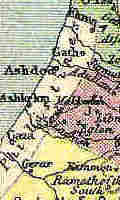
Nevertheless, God is a faithful Covenant God, and he sent a deliverer, Samson.
So like God in his doings, He sent an angel to a barren but godly woman of the tribe of Dan, who was married to Manoah, also a Danite, living in Zoah. The angel told her she must make a vow if she was to conceive a child, a holy vow that would make her a Nazarite for the time of her conception and gestation at least of the coming deliverer the angel promised her. She agreed to the terms, and when she told her husband, he too consented to the terms for the child's conception and birth, and so the covenant was instituted with the death of a kid goat. Not incidentally, the angel is called the angel of the Lord--which leads us to think he was none other than the pre-incarnate Christ, who assumed that title a number of times in the Old Testament in patriarchal times.
What is a Nazarite vow? The Bible describes it in chapter 13: drink no wine or strong drink, eat no unclean thing, and do not shave the hair of the head. The angel said he would be a Nazarite, which removed any question of why he was demanding this of the mother-to-be. He also called him a deliverer and that he was to deliver the people of God from the Philistines, the enemy.
We know it also entailed touching no carcass or dead body. The mother named the baby Samson, and the Spirit of God fell on him from time to time, and what he did with such power as the Spirit gave him is not stated.
Now we see that the Hollywood versions are incorrect. They do not follow the scriptures. It was not the natural strength of Samson but the Spirit of God that fell on Samson that enabled him to do superhuman feats of strength. This means he was not necessarily a champion in physique. Unlike the classic chassis of Charles Atlas, he may have looked quite ordinary and could not boast any great musculature.
By the time featured in chapter 14, he was grown, so this was the start of his twenty year judgeship, it appears. It is at this time Samson goes astray. He turns into a Don Juan-like ladykiller, and becomes enamored of a beautiful Philistine girl. This is a fatal flaw of his--his penchant for pretty girls in low-cut gowns. Did not his own people have attractive girls of marriageable age? Certainly, the Danite tribe did, but if not he could have gone to neighboring tribes and had a look around. Surely, the Lord could have put before his gaze just the one for him--but obviously he wasn't interested in seeking a mate chosen by God, or even a mate chosen by his godly parents. Ignoring the warnings of his parents and also his God, he went off independently and chased a Philistine "vixen" to her den in Timnath, a Philistine city. It is interesting how the scripture, Judges 14:4, states that God used this sin of Samson to position him for the punishment of Philistia.
Thus, we are informed by the writer of Judges, who probably was the Prophet Samuel, that God used the wayward Samson for His own divine purposes, just as He uses the Devil for His own divine purposes.
At this time he kills a lion that charges at him from out of the bushes and rocks beside the trail, and later returns to the carcass and finds bees swarming in it, and gathers the honey they have collected.
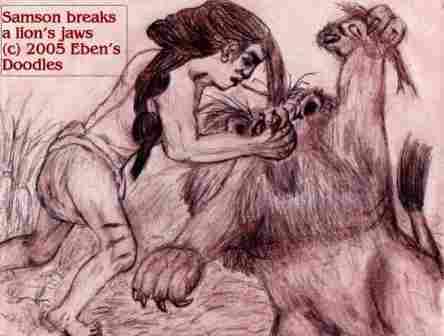
He has sinned against his Nazarite vow, by touching an unclean, dead thing and even eating out of it. To pile injury on the offense, he gives some of the honey to his naive, unsuspecting parents, not telling its origin to them--showing how much he disrespected these godly parents! What a "jerk" this young man is! Can you think of a more disgusting thing to do to your own parents who love you as Samson's parents loved him? In everything, taking the Philistine girl for his wife, breaking his Nazarite vow, and even defiling his parents with honey from the unclean carcass of the dead lion, Samson showed his contempt for God and his parents and his people the Danites!
Judges 14: 12-18 relates the aftermath and consequences of this breach of his vows and his terrible contempt for his parents. He is entangled with a Philistine woman whom he calls his wife, and is entertaining the young men with a riddle about the honey, and his riddle cannot be answered without his wife nagging him so that he gave in to her. Having lost a wager with them after she gives them the solution to the riddle, he has to make good with thirty suits of clothes, so he goes to Ashkelon and kills thirty men and takes their clothes and returns.
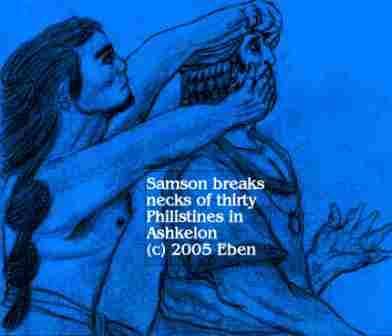
But worse (though God is using the events for the deliverance of His people, we must remember) is soon to come from his riddle-making at the expense of his parents and his Nazarite vows.
His Philistine wife is taken back by the father and both end up dead, killed by the Philistines when they burn the man's house down. Before the house is burnt and they are dead, Samson is so enraged that the father has given his wife-to-be to another man that he ties torches to three hundred foxes he has caught (how can an ordinary man catch 300 foxes?) and sets them afire and they run into the wheat fields and vineyards and olive groves of the Philistines and set them afire. The furious Philistines are now out to take Samson's life, but he gets away. The Philistines then go to war against Israel, the neighboring tribes, and let it be known they are out for Samson's blood, and so the Israelites, to avert the Philistines' reprisals, turn him over bound so tightly with such strong cords they thought he could not possibly get free. Samson, enraged at the treachery of fellow Israelites (though he has already shown he cares nothing for the God of Israel, or his own tribe, or his parents, or even his own holy vows as a Nazarite) breaks his bonds like feeble strings of flax and turns on the Philistine army and slays a thousand men with a donkey's jawbone.
All this activity has made Samson mighty thirsty. He is nearly dead with exhaustion and dehydration, in fact. Always a foxhole convert, he calls on God's grace, after cavalierly reminding God of the great deliverance he has just been involved in, adding that it would now be a very shameful thing if God were to allow him to fall in his weakened state into the hands of the defeated Philistines. God comes through, by grace, not because of Samson's proud blandishments, granting him a miracle: water out of the jawbone. What is this a picture of? A fool, a donkey of a man, blessing himself? It certainly is a miracle, but is it flattering to Samson? You decide.
True to his wayward and sinful bent, Samson follows up this trumping of the Philistines and the act of God's mercy with his trip to Gaza--a notorious Philistine fleshpot simmering away to the south. By the way, this is the same Gaza, the same political hot spot, that is now being used as a safe haven for the Hamas Jehadist terrorists that are hurling missiles at Israel (so have the old Philistines moved back in? It appears so!).
It is in Gaza that Samson sets eyes on a prostitute for hire, and he takes his pleasure with her. The Philistines, alerted to his presence, plan to ambush him in the morning, but Samson lies low until the following midnight and then rips the massive double gates off the hinges of the city's main entrance.

Tearing Gaza's city gates down is one part of the miracle of superhuman, godlike strength. Like Hercules in the Greek stories, he follows one feat with another, just as great, but usually greater. As if he is carrying feathers, he transports the gates all the way to the top of a hill (actually a mountain) bordering Hebron in the mountains of the center of the country.

After this feat, Samson, never learning and always burning with lust, sets eyes on Delilah, a Philistine seductress who lives in the valley of Sorek (probably famous for its beautiful harlots).


Delilah knows just how to handle this man, for she has had considerable experience with men, evidently. To her Samson is always an enemy of her people to be conquered with her feminine charms--to Samson, she is a harmless plaything--and we know who was really deceiving himself here. Delilah is not the despicable one in the affair--she is only doing what she has been trained to do, and she is faithful in every respect to her nation, people, and religion (Samson, on the other hand, knows nothing of faithfulness to any such things!).
Delilah conspires with the Philistine lords of the land to betray Samson to them for a eleven hundred pieces of silver (a lottery-sized windfall in that day, since twenty pieces of silver bought a slave in the time of Joseph, and the price could not have gone up much since then, for by the time of Jesus it was still only thirty pieces, the price paid Judas for betrayed the Lord).
Hollywood has done its best work on this portion, chapter 16 on. Most of us know from Grade B Hollywood films what happened to Samson in the hands of the cunning Delilah, who learned from her mistakes, unlike Samson who never learned from his!
At first he outwits her, for he prides himself on his cunning use of riddles. He has gained the upper hand over the Philistines a couple times with clever riddles, but he rides on his reputation a little too long, and Delilah finally gains the upper hand over him. Unable to bear her constant requests for the truth, he finally, in a weak moment, tells her what she wants to know: the secret of his great strength.
When Samson awakes, he finds his head completely shorn. He is bald! The last part of his vow, his unshorn locks, has been lost, thanks to his revealing the secret to his arch-enemy, a Philistine harlot. Unable to find the supernatural strength that God has always given him from the Spirit of the Lord, he is taken prisoner, and then blinded, and also put to work as an animal grinding grain.
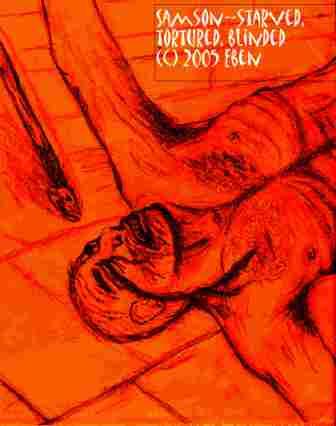
It is all over with Samson! He's a has-been! Or is it over? God has, evidently, forsaken him, and Samson deserves his terrible fate. Or has God never for one moment forsaken him? Is God still
looking out for him despite all his Prodigal Son-like sins and waywardness? Is God still with Samson in his prison house in Gaza?
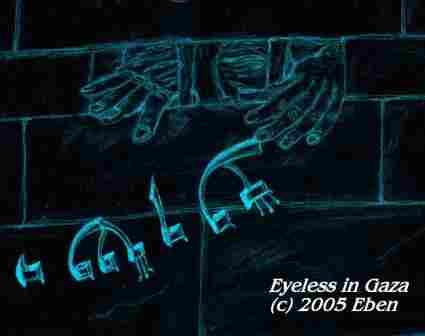
Whose name is written on the wall in Hebrew? How did it get there? Does Samson know it was there? He can't possibly see it.
A final scene arrives in the closing portion of the 16th chapter--a most stunning spectacle that only Hollywood can do justice to with all its dramatic skills of presentation and special effects. Samson is dragged out of the prison's mill where he has labored a long time, blinded and in chains (fettered at the ankles just to make sure he couldn't possibly run away). What could be so entertaining to the Philistine view than to present him at a convocation of the leading Philistines at their great temple--present him in such a way as to glorify their victory over this once great champion of the Israelites, who are now their servants, unable to throw off their yoke despite their claim to knowing a greater God than Dagon, the "fishy" Philistine corn-god? What was so bad about Dagon the idol? It was a fertility cult, with priests and priestesses serving as prostitutes to all who came to worship Dagon! That was high religion in the days of Samson, and the Israelites gave up the only True, Wise, Loving, Holy God, the God of Abraham, Isaac, and Jacob, for this abomination called Dagon.

Imagine the temple of the fish-bodied corn-god thronged to the gills, so to speak. They bring him out to the view of the thousands gathered in the temple, seated inside and also on the roof. They make "sport" of him, perhaps taunting him to fight them, though he is blind and probably naked and cannot see who is jabbing indecently and viciously at him from all sides. When the crowd tires of this, he is let alone and they all turn to feasting and drinking and carousing, the real purpose for the convocation (this is the pagan religion, which is based on an orgy of sex and booze and dancing prostitutes, just as Hollywood likes to depict the party-going Philistines, which, by the way, are perfect copies of the "sophisticated" Hollywood crowd of today--and we wonder how relevant the Bible is?).
The climatic scene comes to the high point as Samson, his hair grown back, asks a boy to help him identify the two central pillars supporting the whole edifice. The temple was packed to the rafters. On the roof was an overflow crowd of three thousand men and women. High society is present from all over Philistia to have a mad fling, a sort of Academy Awards Night Party to end all such parties! The designer gowns, the jewels, the lights, the entertainers, the music--it is a smashing success--the ratings are sky-high, and the organizers of the event are already congratulating themselves with toast after toast.
Then, completely forgotten by the celebrating crowds, Samson prays God will avenge him, for what the Philistines have done to him (though it is really his fault, his blinding and his imprisonment and disgrace).
His prayer is noteworthy, however: And Samson called upon the Lord, and said, "O Lord God, remember me, I pray thee, and strengthen me, I pray thee, only this once, O God, that I may be at once avenged of the Philistines for my two eyes."
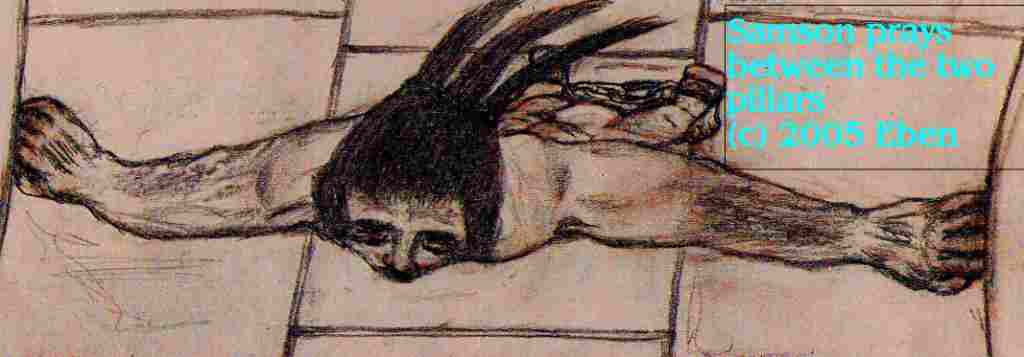
As we have seen and the Bible has plainly stated, God had used Samson in his sinful state. Why not now, even moreso, in his repentance? Surely, God was even more willing to use Samson in his repentant state. Was it so repentant? He hated the Philistines with a passion for destroying his sight--but he had delivered himself into the hands of the Philistine enemy by revealing the secret of his Nazarite vow (something he should never have told a pagan idol-worshiper).
Surely, he had suffered much for his sin. Was that enough to qualify as genuine repentance or a change of heart. Did Samson revere God after all he had suffered in the way of self-punishment? God had allowed his destruction, so why was Samson qualified to ask for mercy and grace now? Would God listen to his prayer? What grounds did Samson have to stand on anyway? Had he been faithful to God? Absolutely not! He wouldn't be standing where he was, in a pagan temple, if he had been faithful! So why should God grant him his request?
God called Samson to be a Judge of Israel! That is the answer. It was God, acting on His own holy initiative, not on account of any of Samson's merits, which were few and far between as the record of his life testifies. Samson was a "ratfink", in plain vernacular. He was not admirable in any way. He brought disgrace on himself, his parents, on his tribe, on Israel, and on his God. He never learned from his misdeeds. He lived only for sex and selfish pleasure. Yet God had chosen him, not some other man, to be Israel's deliverer and Judge. God granted him the holy office. Samson could have never thought it up or gained it even if he had desired it with all his heart (his behavior showed he actually despised his calling).
Suffering can be a great purifier of men's souls, however. Suffering can humble a man, even cause him to be broken and contrite in spirit. And this sinner had suffered much. How do we know that this prayer of Samson was not the first humble and contrite prayer he had ever prayed? How do we know that he hadn't come back to God with all his heart, surrendering his life to the Lord God, something he had obviously never done before this time? Let us give him the benefit of a doubt, that he ceased to be a jerk and a joke. This Samson now standing stripped naked as a jaybird between the two pillars was broken, contrite, and humble, just the right instrument for God to use for His glory.
The Bible also states that the gifts of God are without repentance. God had chosen him, and he was still chosen of God, just as Israel is the Chosen People of God no matter how much they have disobeyed God.
And the record states that he got exactly what he asked: God's divine strength. No man, no human being alive then or since could have pushed down the two massive supporting pillars of this great Philistine temple. But Samson---you know the rest. The Bible states: "The effectual, fervent prayer of a righteous man availeth much." That is an understatement, when you consider this event. God was, indeed, glorified. Samson killed more Philistines at his death and all the thousands he slew in his life. Thanks to his sacrifice of himself, Israel was delivered from the Philistines for another forty years. God used him gloriously, though a moral bankrupt, during his lifetime. And God used him at the end, at his death, when he made a complete turn-around in his heart. Otherwise, God would have ignored Samson, and we might never have heard of him. Someone said the end of a thing is better than its beginning, and for Samson this is a true saying. He began badly and ended well, very well. God's stamp of approval, at the end, is unmistakable, for it is full of mercy and grace, removing the terrible, black cloud of disgrace that covered the fallen man. If Samson had not prayed, he would never have been heard of again, beyond doubt. God would have passed over him and found another man. But Samson prayed, devoutly, humbly, contritely, to his faithful, Covenant God of Israel, and God could not turn away His ear from this prayer. We see a poor, broken spirit reaching up a desperate hand to God, and God reaching down His mighty hand of grace and mercy to him. The two hands came together, God's and man's, and a miracle of Amazing Grace resulted, the mighty delivering power of God was unleashed for all the world to witness!
This is a figure, indeed, of what transpired on the Cross of Christ. Jesus, in his humanity, reached up to God the Father, and the Father reached down, taking His Son's hand, working the great Work of Salvation and Amazing Grace for all the world to see and for all the demonic powers and realms to witness and wail over. It isn't, you see, just about five thousand or so Philistines being killed in the collapse of their sordid temple of sexual vice. This is God's victory over sin and death and the power of the devil, prefigured. No wonder Samson is given four entire chapters in holy scripture. No wonder he is a figure of Christ the Deliverer of all mankind (including Israel) from the hands of the Enemy. Because of how God treated him, there is hope, great hope, for any washed-up man and woman, any Christian too who thinks it is all over, that God will never hear another prayer. Try this God today, if you fit any such category and are honest enough to admit it. He is still waiting for you to call upon Him, just as He waited upon Samson once upon a time. You don't have to die like Samson died. God will restore you, and use you, beyond your wildest dreams. Just give Him your washed-up Christian self, with all your failures and sins repeated a thousand times, and He (the Mighty, Gracious God of Samson) will do the rest.

Students of the Bible and the Emmaus Walk, please read all of Romans 6. There will be some questions on it later, so look for a link to them on the Home Page. This chapter has Samson written all over it! If only Samson had had the benefit of this word, he might have spared himself the terrible ordeal he suffered at the hands of the cruel Philistines. But then, he might have read it and still gone on to learn his lesson the hard way. Some of us are like Samson--we have to learn, it seems, the hard way. But, whether hard or easy, we need to learn and get the lesson God is wanting to teach us! Let us not go round and round the mountain, never learning, just like the generation of Israelities in the wilderness, who never learned, and all perished in in the rocks and sand of deserts of Sinai, when just a few miles north of them lay the Promised Land, where they could have been enjoying a new life amidst green hills and flourishing fields and vineyards, if only they had chosen to deny themselves (the flesh, the old man) and choose life, the life of obedience and love of God! We read their negative example, which is so much like Samson's it gives us deja vu--with a vengeance. If only--those are the saddest words ever spoken, are they not? Let us not have that written over our our lives! It is our choice. A bonus of some kind (perhaps special mention here on this page) will be given you if you figure out the Hebrew letters inscribed on Samson's jailhouse wall.

The Emmaus Walk Home Page

(c) 2006 Butterfly Productions, All Rights Reserved

